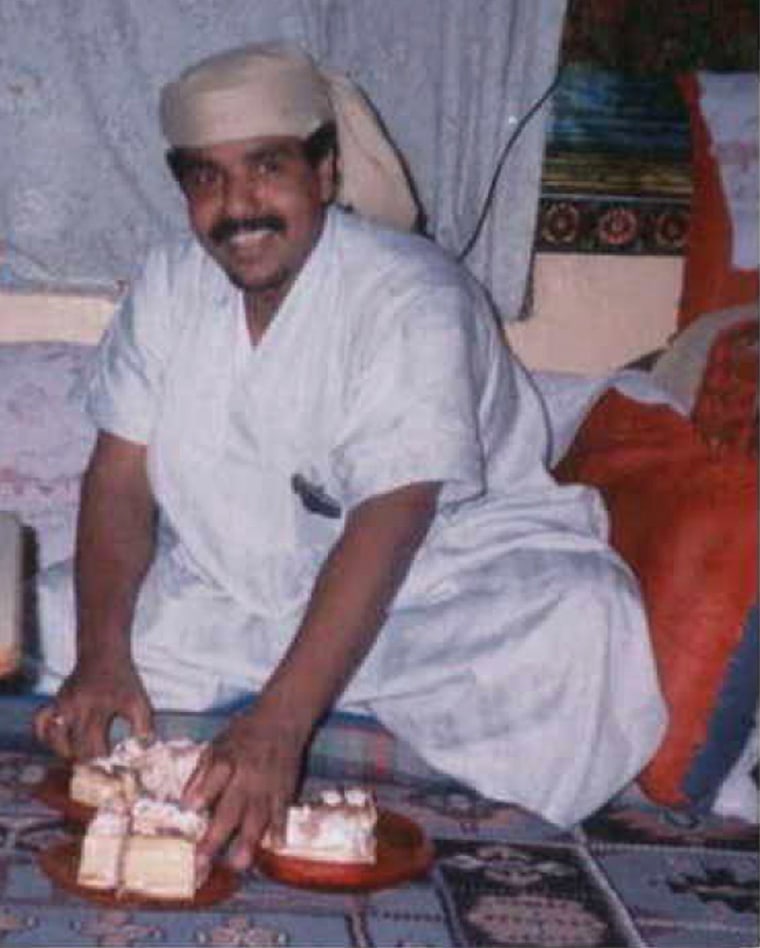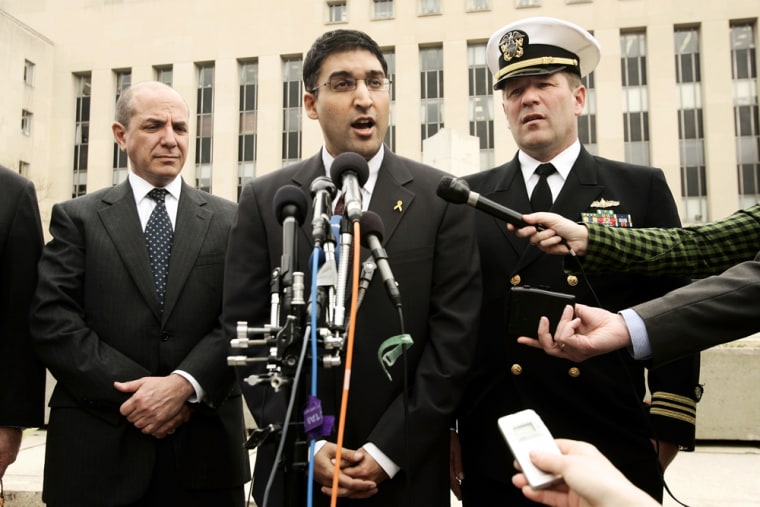Are the 540 al-Qaida and other suspects held at the naval base at Guantanamo Bay, Cuba., entitled to prisoner of war status under the 1949 Geneva Convention?
Or are they unconventional enemies in a new kind of war, not wearing uniforms, not serving a nation-state, and therefore not protected by the Geneva Convention?
A three-judge panel of the Court of Appeals in Washington wrestled with those questions Thursday during 90 minutes of oral arguments in the case of Salim Ahmed Hamdan, an alleged chauffeur and bodyguard for Osama bin Laden.
With the national security stakes so high in Hamdan's case, it seems inevitably headed to the Supreme Court for final resolution.
Hamdan, a Yemeni who was captured in Afghanistan in 2001, has acknowledged working for bin Laden but says he was unaware of bin Laden’s terrorist activities.
A terrorist or only a driver?
After Thursday’s hearing ended, a reporter asked Navy Lt. Cmdr. Charles Swift, who represented Hamdan at Guantanamo, how the Yemeni could admit to being bin Laden’s driver, yet claim to have not taken part in any al-Qaida terrorism.
Swift replied, “A driver, whether he is Hitler’s driver, Martha Stewart’s driver or any other driver, doesn’t necessarily have any knowledge of what’s going on. Driving Osama bin Laden around didn’t kill anybody. ... He has the great misfortune of having chosen a terrible employer, but that doesn’t make him a terrible person.”
The United States has charged Hamdan with being part of a conspiracy to attack American civilians, acting as an illegal combatant, in violation of the traditional laws of war.
He was being tried by a military commission at Guantanamo last November when federal district Judge James Robertson intervened and halted the trial.
Robertson ordered the government to convene a tribunal of military officers to determine whether Hamdan is a prisoner of war, an illegal enemy combatant or perhaps an innocent man with no role in al-Qaida.
For the time being, Robertson said, Hamdan does get Geneva Convention protections.
Does Geneva Convention apply?
Urging the appeals court to overturn Robertson’s ruling, Assistant Attorney General Peter Keisler told the appeals court that al-Qaida is not a signatory to the Geneva Convention.
By attacking unarmed civilians, not wearing uniforms and not carrying their weapons in plain sight “they openly defy the principles of Geneva,” he said.
Keisler urged the appeals court to consider “the surpassing importance of protecting procedures and methods” of gathering military intelligence about al-Qaida. “We’ve never had a conflict in which intelligence was so important,” he declared.
Therefore, he argued, the government was justified in excluding Hamdan from a pretrial voir dire proceeding in which top-secret intelligence was discussed.
Keisler argued that one of the ideas that underlies the Geneva Convention is reciprocity: If the United States were to treat captured enemy soldiers according to civilized rules, then the enemy country would try U.S. solders that it captures likewise. But al-Qaida and the Taliban will not try any American soldiers they capture in a court or according to any military tribunal, he said.
Keisler contended that the U.S. officers who serve on the tribunal conducting Hamdan’s trial could be trusted to give him a fair proceeding, just as fair as if he were tried by federal judges. “The fact that they’re wearing uniforms and you’re wearing robes doesn’t make a difference,” Keisler told judges A. Raymond Randolph, John Roberts, and Stephen Williams.
‘Ad hoc procedures’
Rebutting Keisler, Hamdan’s attorney Neal Katyal assailed the tribunals set up by a Nov. 13, 2001, order of President Bush as “not a system of law. It is a system of ad hoc procedures crafted at will.”
Under Bush’s order, accused al-Qaida members are entitled to “a full and fair trial,” right to counsel and conviction upon the concurrence of two-thirds of the officers serving on the commission.

Katyal said, “The president is not above the law, and when he prosecutes someone — we’re talking about putting someone in life imprisonment — he’s bound by sources of law. He can’t do what he wants at his whim.”
Article V of the 1949 Geneva accord must apply to Hamdan, Katyal told the court. That provision says that if there’s any doubt as to whether a person captured is a soldier, then he has to be treated as if he is entitled to Geneva protections, including the right not to be put on trial by those who capture him.
But Judge Randolph questioned whether U.S. courts had any power to enforce Article V. Treaties are often enforced strictly through diplomatic bargaining between two countries and not by U.S. courts.
Katyal said, "The whole point of the Geneva Conventions and a criminal trial is to determine whether or not Mr. Hamdan is al-Qaida. You can’t cut that off ahead of time with a presidential determination carte blanche.”
Undermining defendant's sanity
Katyal and Swift said 10 months of solitary confinement has undermined Hamdan’s sanity.
“Solitary confinement has done him significant damage and will continue to do damage to some point at which he will no longer be able to function,” Swift told reporters outside the courthouse.
Katyal and Swift argued that not allowing Hamdan to stay in the Guantanamo courtroom for part of the voir dire proceeding was a violation of his rights under international law.
Officers whom the government had picked to take part in Hamdan’s trial “had participated in Afghanistan (combat) and/or in his transfer to Guantanamo, and he was not allowed to hear what they had to say on those points,” Swift said.
The Bush administration has held what it calls Combatant Status Review Tribunals, each made up of three U.S. military officers, to determine if each of the 558 detainees held at Guantanamo was an enemy combatant.
The tribunals determined that 38 of the detainees that had been held at Guantanamo were not, in fact, enemy combatants and most of them have been released to their home countries.
